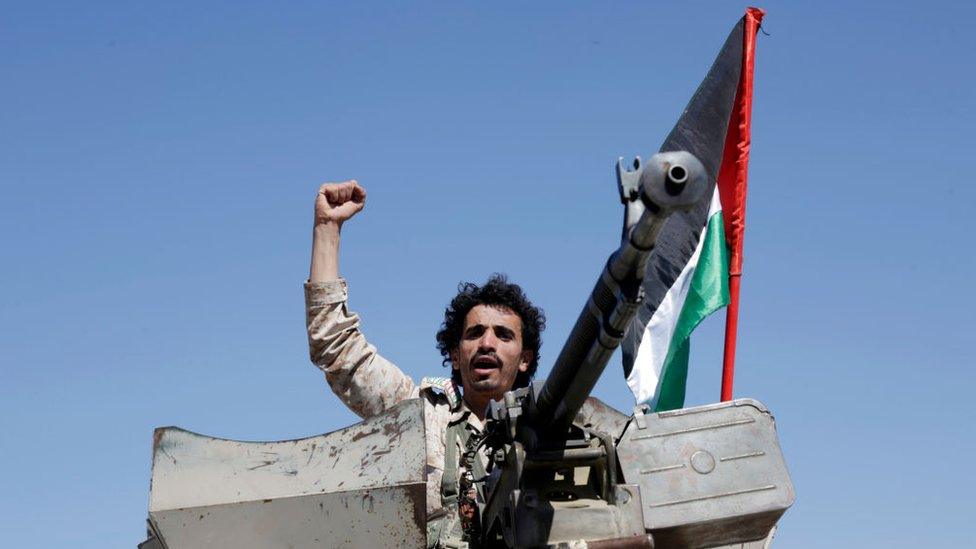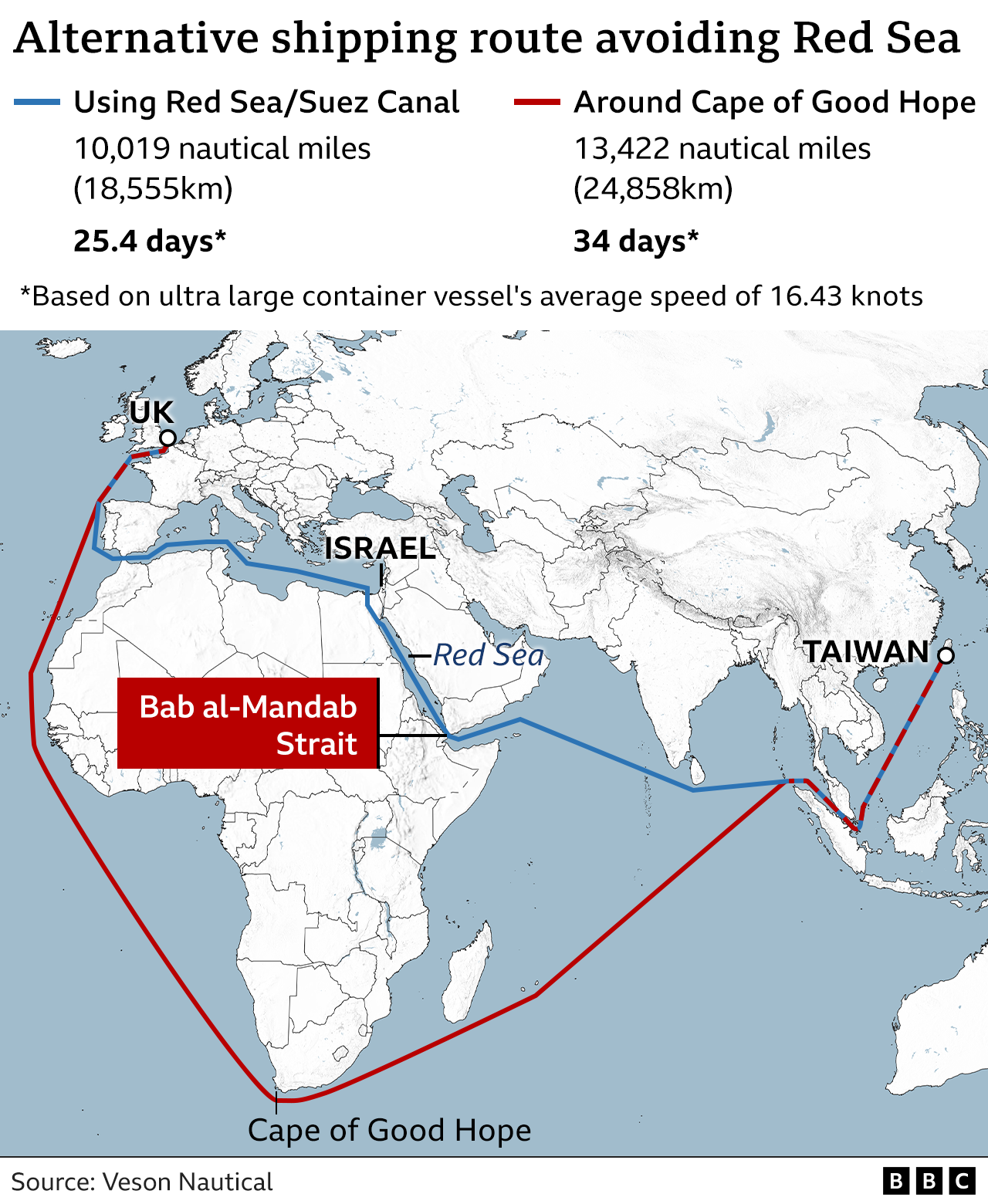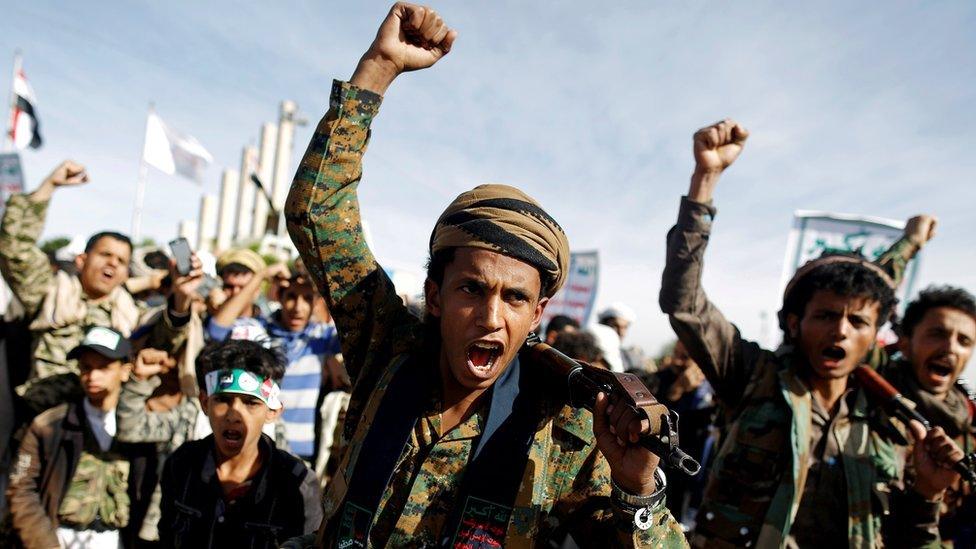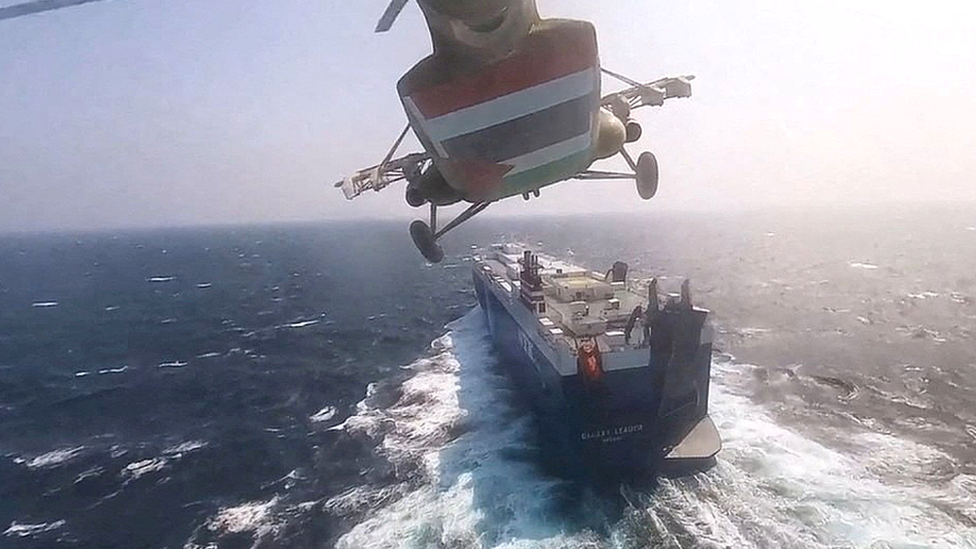Yemen strikes: Houthis hit US-owned ship after 'terror' designation
- Published

Yemen's Houthis have targeted a US-owned vessel in the Gulf of Aden after Washington said it will re-designate the group as "global terrorists".
The group said they hit the "Genco Picardy" bulk carrier with missiles which resulted in a "direct hit".
The US military says the vessel was hit by a drone on Wednesday evening.
Washington's new designation of the Houthis will require US financial institutions to freeze Houthi funds and its members will be banned from the US.
The Houthi attacks in the Gulf of Aden and neighbouring Red Sea are a response to Israel's military operation in Gaza.
Earlier this month, the UK and US launched air strikes on dozens of Houthi targets in Yemen in an attempt to stop the group from targeting vessels in the waters.
On Wednesday evening, a Houthi spokesperson said the group had successfully targeted the Genco Picardy, and that the attack was a response to "the American-British aggression against our country".
The US military said the ship was hit by a drone launched from Houthi controlled areas in Yemen. It said there was some damage but no injuries, and the vessel remained seaworthy.
US National Security Advisor Jake Sullivan said the re-designation of the Houthis as "global terrorists" is in response to the Iran-backed group's attacks on commercial shipping in the region.
The move to re-designate the Houthis reverses Secretary of State Antony Blinken's 2021 decision to remove the rebels from the US Specially Designated Global Terrorist List (SDGT).
In a statement, Mr Sullivan said the recent Houthi attacks "fit the textbook definition of terrorism", as they have put US personnel in danger and jeopardized global trade operations.
"If the Houthis cease their attacks in the Red Sea and Gulf of Aden, the United States will immediately re-evaluate this designation," Mr Sullivan added.
In the waning days of the Trump administration officials imposed the SDGT and foreign terrorist organisation (FTO) labels on the Houthis.
This action was taken despite warnings from the UN and aid groups that it could push war-torn Yemen into a large-scale famine.
But in 2021, shortly after President Joe Biden's inauguration, that decision was reversed by Mr Blinken, the newly installed Secretary of State. He cited the dire humanitarian situation faced by the people of Yemen.
Speaking to reporters ahead of Wednesday's announcement, senior administration officials defended the decision to reinstate the SDGT designation but not the FTO designation, which they said had been taken to ensure the continued flow of aid into Yemen.
"It was the correct step to revoke," one official said, arguing that it was a move taken in "recognition of a very dire humanitarian situation" in the country and to ensure that "US policies weren't impeding" civilians' access to urgent aid.
But they accepted that the Houthis' campaign of attacks on commercial shipping, which has now seen dozens of missiles fired at vessels in the Red Sea, has become "unacceptable".
The new SDGT designation will also bar people and companies in the US from offering any support to the Houthis.
However, officials were keen to emphasise that a range of exemptions will be worked into the new designation to ensure humanitarian aid continues to flow into Yemen, a country devastated by almost a decade of civil war.
"We are rolling out unprecedented carve outs and licenses to help prevent adverse impacts on the Yemeni people," said Mr Sullivan in his statement. "The people of Yemen should not pay the price for the actions of the Houthis."
The Houthis began attacking merchant vessels in November, saying they were responding to Israel's military operation in Gaza. Since then, the group has launched dozens of attacks on commercial tankers passing through the Red Sea, one of the world's busiest shipping lanes.
In response, the US and UK launched a wave of air strikes against dozens of Houthi targets on 11 January. The strikes - supported by Australia, Bahrain, the Netherlands and Canada - began after Houthi forces ignored an ultimatum to cease their attacks in the region.
Biden administration officials denied that the new terrorist designation was an acceptance that the air campaign may not deter further Houthi attacks.

"We see these sanctions as one piece of a broader effort to bring the Houthis back from the terror attacks they are currently committing," one official said. "Our sanctions are best not seen in isolation but as part of a broader effort."
In the wake of last week's strikes, the Houthis said the US and UK would "soon realise" the action was "the greatest folly in their history".
"America and Britain made a mistake in launching the war on Yemen because they did not benefit from their previous experiences," senior Houthi official Mohammed al-Bukhaiti wrote on social media.
Yemen has been devastated by a civil war that escalated in 2015, when the Houthis seized control of large parts of the west of the country from the internationally recognised government and a Saudi-led coalition intervened in an effort to restore its rule.
The fighting has reportedly left more than 160,000 people dead and triggered one of the world's worst humanitarian crises, with two thirds of the population - 21 million people - in need of some form of aid.
Related topics
- Published25 March

- Published12 January 2024

- Published12 January 2024
